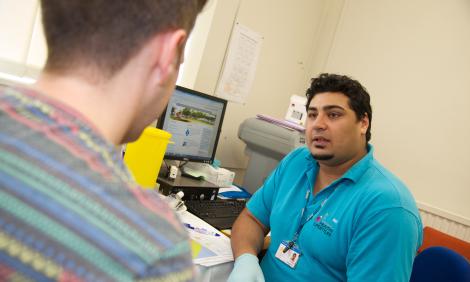Community sexual and reproductive health
Doctors working in community sexual and reproductive health care for people’s sexual health by treating sexually transmitted diseases and consulting on contraception, menopause and unplanned pregnancies.
You’ll provide clinical expertise and leadership to community-based services designed to reduce health inequalities in sexual and reproductive health.
Life as a doctor in community sexual and reproductive health
Your patients will come from diverse backgrounds, but many will come from vulnerable groups such as young people, sex workers and victims of sexual assault. You’ll undertake specialist clinics, receive referrals and oversee training of both staff and other providers of sexual health services.Services are delivered in multiple community settings ranging from large centres with extensive teams to small centres operated single-handedly. Wherever you work, you’ll be part of a wider multidisciplinary team of experts, which will include colleagues from genitourinary medicine, formed to improve the sexual health of the community.
Common procedures and interventions
For contraception
- fitting and removing intrauterine contraceptives
- fitting and removing subdermal contraceptive implants
For medical gynaecology
- outpatient hysteroscopy (using fibreoptic endoscopy to view the interior of the uterus)
- endometrial ablation (using an instrument to destroy or ablate the endometrium)
- transvaginal ultrasound
- insertion of hormone implants
- early abortion with local anaesthesia
While your patients’ conditions are generally not life-threatening, most people require sexual health advice or treatment in their life. Moreover, many women will suffer gynaecological problems that can profoundly affect them and their families. So you can impact significantly on a patient’s quality of life.
How much can I earn?
You’ll first earn a salary when you start your foundation training after medical school. Find out details of current salary ranges for foundation and specialty training, SAS doctors and consultants on the 'Pay for doctors' page.
How about the benefits?
- make a difference
- flexible and part-time working
- high income early in your career
- work anywhere in the world
- excellent pension scheme
- good holiday entitlement
- NHS discounts in shops and restaurants
Must-have skills
- excellent communication skills to manage a wide range of relationships with colleagues, and patients and their families
- emotional resilience, a calm temperament and the ability to work well under pressure
- teamwork and the capacity to lead multidisciplinary teams
- problem-solving and diagnostic skills
- outstanding organisational ability and effective decision-making skills
- first-class time and resource management for the benefit of patients
In addition, community sexual and reproductive health doctors need to demonstrate:
- sensitivity and listening skills
- a non-judgmental approach
Entry requirements
Your first step is medical school. Typically, you’ll need excellent GCSEs and three A or A* passes at A level including chemistry for a five-year undergraduate degree in medicine. Many medical schools also ask for biology and others may require maths or physics.
If you already have a degree, you could study for a four-year postgraduate degree in medicine.
You’ll need to pass an interview and admissions test. You’ll be asked to show how you demonstrate the NHS values such as compassion and respect.
Some medical schools look to recruit a mix of students from different backgrounds and geographical areas, so your educational and economic background and family circumstances could be considered as part of your application.
What are my chances of starting a career in community sexual and reproductive health?
In 2021, there were 124 consultants in community sexual and reproductive health in the NHS in England.How to become a doctor in community sexual and reproductive health
After medical school, you’ll join the paid two-year foundation programme where you’ll work in six placements in different settings.
After your foundation programme, you can apply for paid specialty training to become a community sexual and reproductive health doctor, which will take a minimum of 6 years.
You may be able to train part time, for example for health reasons or if you have family or caring responsibilities.
Where a career as a community sexual and reproductive health doctor can take you
You could:
- specialise or conduct research in areas such as improving choice, access and uptake of contraception
- teach medical students or postgraduate students in training
- get involved in research at universities, the NHS or private sector
-
These organisations have further information about being a doctor in community sexual and reproductive health, particularly as your career progresses. Take a look.
The Faculty of Sexual and Reproductive Healthcare
And hear from people working in sexual and reproductive health:





